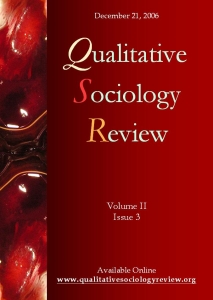Concepts and Concept Formation: Goffman and Beyond
DOI:
https://doi.org/10.18778/1733-8077.2.3.04Keywords:
Grounded concepts, Goffman, Research methods, Concrete examples, Cognates, Awareness structures, EmbarrassmentAbstract
The social and behavioral sciences need distinctive concepts to escape entrapment in cultural assumptions. Currently there are several sources for concepts, but vernacular words are most frequently used. These words are usually ambiguous and may reaffirm the status quo. This essay proposes that a new approach is implied in Goffman’s work. Most of the new terms he invented went undefined. However, he can be seen as struggling in much of his writing to develop two basic components of the “looking-glass self,” awareness structures and embarrassment. His method seems to have involved using many vernacular cognates and close examination of detailed examples of each concept. The implication is that it might be possible to ground concepts by 1. Listing and examining links to vernacular and technical cognates, and 2. Closely exploring many concrete examples. A study of one type of awareness structure, collective denial (Zerubavel 2006), can also be used to illustrate the potential of this method.
Downloads
References
Blumer, Herbert (1986) Symbolic interactionism: perspective and method. Berkeley: University of California Press.
Google Scholar
Bruner, Jerome (1983) Child’s Talk. New York: Norton.
Google Scholar
Charmaz, Kathy (2006) Constructing Grounded Theory. Thousand Oaks, CA: Sage.
Google Scholar
Clark, Herbert H. and Catherine Marshall R. (1981) “Definite reference and mutual knowledge.” Pp. 10-63 in Elements of Discourse Understanding, edited by A. Josh, B. Webber, I. Sag. Cambridge: Cambridge University Press.
Google Scholar
Clark, Herbert H. and Susan Brennan (1996) “Grounding in communication.” Pp. 31-58 in Perspectives on Socially Shared Cognition, edited by L. Resnick, J. Levine and S. Teasley. Washington, D.C.: American Psychological Association.
Google Scholar
Cooley, Charles H. (1922) Human Nature and the Social Order. New York: Scribner’s.
Google Scholar
Elias, Norbert (1984) The Loneliness of the Dying. Oxford: Blackwell.
Google Scholar
Giddens, A. (1984) The Constitution of Society. Berkeley, CA: University of California Press.
Google Scholar
Glaser, Barney and Anselm Strauss (1965) Awareness of Dying. Chicago: Aldine.
Google Scholar
Glaser, Barney and Anselm Strauss (1967) The Discovery of Grounded Theory. Chicago: Aldine.
Google Scholar
Goffman, Erving (1959) Presentation of Self in Everyday Life. New York: Anchor.
Google Scholar
Goffman, Erving (1967) Interaction Ritual. New York: Anchor.
Google Scholar
Goffman, Erving (1969) Strategic Interaction. Philadelphia: University of Pennsylvania Press.
Google Scholar
Goffman, Erving (1983) “The Interaction Order.” American Sociological Review 48:1-17.
Google Scholar
DOI: https://doi.org/10.2307/2095141
Lazarus, Richard (1997) Stress and Emotion. London: Free Association Press.
Google Scholar
Lewis, Helen (1971) Shame and Guilt in Neurosis. New York: International Universities Press.
Google Scholar
Malle, Bertram and Sara Hodges (2005) Other Minds: How humans bridge the divide between self and other. New York: London.
Google Scholar
Pascal, Gabriel (1660/1982) Pensees. (Thoughts). Paris: Editions du Cerf.
Google Scholar
Plutchick, Robert (2003) Emotions and Life. Washington, D.C.: American Psychological Association.
Google Scholar
Quine, Willard (1978) “A Postscript on Metaphor.” Critical Inquiry 5(1):161-162.
Google Scholar
DOI: https://doi.org/10.1086/447978
Retzinger, Suzanne (1991) Violent Emotions: Shame and Rage in Marital Quarrels. Newbury Park: Sage Publications.
Google Scholar
DOI: https://doi.org/10.4135/9781483325927
Retzinger, Suzanne (1995) “Identifying Shame and Anger in Discourse.” American Behavioral Scientist 38(8):541-559.
Google Scholar
DOI: https://doi.org/10.1177/0002764295038008006
Scheff, Thomas J. (1994) Bloody Revenge. Boulder: Westview.
Google Scholar
Scheff, Thomas J. (1997) Emotions, the Social Bond, and Human Reality. Cambridge: Cambridge U. Press.
Google Scholar
DOI: https://doi.org/10.1017/CBO9780511549496
Scheff, Thomas J. (2004) “Social and Emotional Components in Self-Esteem.” Journal of the Theory of Social Behavior 34: 73-90 (With David Fearon, Jr.)
Google Scholar
DOI: https://doi.org/10.1111/j.1468-5914.2004.00235.x
Scheff, Thomas J. (2005) “Looking Glass Self: Goffman as Symbolic Interactionist.” Symbolic Interaction 28(2):147-166.
Google Scholar
DOI: https://doi.org/10.1525/si.2005.28.2.147
Scheff, Thomas J. (2006) Goffman Unbound! A New Paradigm in Social Science. Boulder: Paradigm Publishers.
Google Scholar
Scheff, Thomas J. (2006a) “Awareness Structures: Ccnceptualizing Alienation and Solidarity.” Unpublished manuscript.
Google Scholar
Schudson, Michael (1984) “Embarrassment and Erving Goffman’s Idea of Human Nature.” Theory and Society 13(5):633-648.
Google Scholar
DOI: https://doi.org/10.1007/BF00160911
Shaver, Phillip R., Shelley Wu and Judith C. Schwartz (1992) “Cross-cultural similarities and differences in emotion and its representation.” Pp. 175-212 in Emotion. Review of personality and social psychology, No. 13, edited by M. S. Clark. Thousand Oaks, CA: Sage Publications.
Google Scholar
Sperber, Dan and Deirdre Wilson (1986) Relevance. Cambridge, MA: Harvard U. Press.
Google Scholar
Stern, Daniel (1977) The First Relationship. Cambridge: Harvard University Press.
Google Scholar
Strauss, Anselm and Juliet Corbin (1998) Basics of qualitative research: techniques and procedures for developing grounded theory. Thousand Oaks: Sage Publications.
Google Scholar
Zerubavel, Eviatar (1997) Social Mindscapes: An invitation to cognitive sociology. Cambridge: Harvard.
Google Scholar
Zerubavel, Eviatar (2006) The Elephant in the Room: silence and denial in everyday life. New York: Oxford University Press.
Google Scholar
DOI: https://doi.org/10.1093/acprof:oso/9780195187175.001.0001
Downloads
Published
How to Cite
Issue
Section
License

This work is licensed under a Creative Commons Attribution-NonCommercial-NoDerivatives 4.0 International License.











